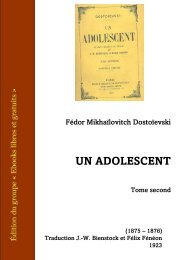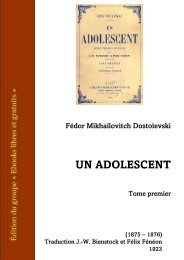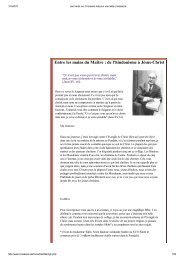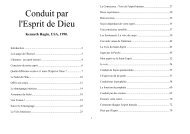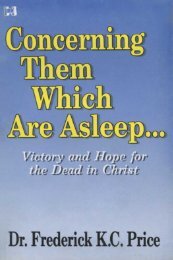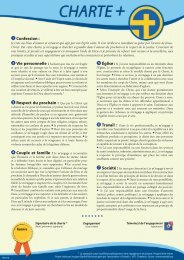341332
Create successful ePaper yourself
Turn your PDF publications into a flip-book with our unique Google optimized e-Paper software.
6 FATHERS, PASTORS AND KINGS<br />
ancien régime. These decades were of decisive importance for the recovery of its<br />
confidence and status within church and society. No doubt this in turn was<br />
helped at one level by the fact that it was during these decades that the nobility<br />
regained and consolidated its hold over appointments, despite a rise in commoner<br />
nominations during the early years of Henri IV’s reign and during the<br />
1630s. The period also saw an increase in the number of bishops who possessed<br />
an impressive educational record, with even the sons of the nobility now attending<br />
university. Bergin estimates that 84 per cent of bishops during the period<br />
1589–1661 held a degree of some kind, with growing numbers opting for<br />
theology rather than law. 18 This was a considerable increase since 1614, when,<br />
according to Hayden, only 38 per cent did so. 19 Essential as they are to our<br />
knowledge of the episcopate and French society, however, these findings actually<br />
raise new questions, about matters such as the effect of improved educational<br />
levels on the outlooks and expectations of bishops. Did growing theological literacy<br />
have an impact upon their understanding of their office? Well-educated<br />
bishops were hardly likely to be satisfied with traditional doctrines on episcopacy,<br />
several of which had never been fully developed. And if this was so, to<br />
whom did bishops look to supply new ideas that would improve upon what they<br />
considered the inadequacies of existing thought? So, despite the progress made<br />
since the 1970s, there are further significant aspects of the history of episcopacy<br />
and of early modern catholicism which have been almost completely neglected<br />
by historians.<br />
The time is ripe for a fresh study of the episcopate, for none of the above<br />
studies has addressed a profound issue: the significance of episcopacy to those<br />
who filled its ranks. The central goals of this book are, first, to investigate the<br />
ideas, both established and still emerging, of what the office of bishop meant to<br />
its incumbents and, second, to trace the ways in which that understanding<br />
coloured their involvement in the hierarchical Tridentine church and in a temporal<br />
realm governed by a vigorously gallican monarchy. 20 A series of short<br />
essays by Pierre Blet, Raymond Darricau and Réné Taveneaux have already suggested<br />
some possible conceptions of episcopacy that circulated within France,<br />
in particular among reformers and Jansenists. They highlight the traditional<br />
titles of pastor, judge and vicar that denoted functions of episcopacy, but none<br />
ventures to gauge systematically the practical impact of these images on more<br />
than a select and small band of bishops. 21 In fact, these articles simply whet the<br />
historical appetite, for they concentrate almost entirely on two specific aspects<br />
of the episcopal office: administration and teaching. Yet for seventeenth-century<br />
theologians, canonists, reformers and bishops, these were not the only<br />
dimensions to the episcopate. A multilayered approach to ideals and ideology<br />
which takes account of this fact produces a far more complete understanding of<br />
the principles that guided bishops in their manifold activities.







